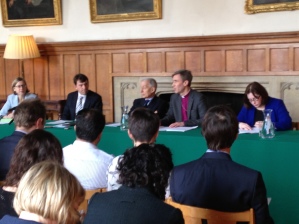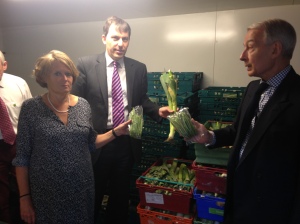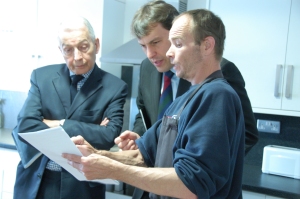Latest News
The Inquiry published its final report in the House of Commons on Monday 8th December, having taken evidence on the extent and causes of hunger in Britain, the scope of provision to alleviate it and a comparison with other Western countries.
You can read the report, Feeding Britain, by clicking here. A full review of the Inquiry’s evidence can be read by clicking here.

The Inquiry team visited FareShare on Monday 19 May, and held regional evidence sessions in Birkenhead on Friday 23 May, Salisbury on Friday 6 June, Cornwall on Friday 20 June, and South Shields on Friday 4 July. You can read more about these sessions by clicking here. Additional visits were made to FoodCycle on Monday 8 September and Community Shop on Thursday 13 November.
A series of meetings were held in Parliament to gather further evidence.
The Inquiry intends to pose a series of key questions to each of the political parties in the run-up to the next general election about how they will respond to rising hunger and food poverty in this country.
The Inquiry published its first two evidence papers in spring and summer 2014 on long-term trends in household expenditure. You can read each of these by clicking here.
The Inquiry received early evidence showing that:
- The rising costs of housing, food and fuel have had an adverse impact on households’ ability to buy and cook meals. Since 2003 food, fuel and housing costs have all increased at a greater rate than earnings, with food (46.4%) and fuel costs (154%) increasing by a significantly greater amount than both earnings (27.9%)and overall inflation (37.7%). Oil and food price spikes will have contributed disproportionately to these increases. This is likely to have had a greater negative impact on living standards for the poorest households.

- Just 2% of edible surplus food generated by food retailers, manufacturers and suppliers that is fit for consumption, is currently redistributed. 98% of this surplus food is currently turned into compost or energy, or disposed of in landfill.
- During its Birkenhead evidence session, the Inquiry also heard from a local resident who had relied on food assistance, who said: “Nobody wants to go to the food bank. Nobody wants to jump through the hoops. Everybody would rather have hope… Council Tax is the final nail in the coffin,” and that some people were turning up to food banks so hungry that they “would eat everything on the table if they could.”
Based on these early pieces of evidence, the Inquiry published a first set of preliminary recommendations on 2 June 2014:
1. The food industry should set itself a target of reducing the amount of surplus food disposed of in landfill, and turned into compost or energy, by 100,000 tonnes each year by the end of the next parliament. This should be achieved by preventing waste in retail and supply chains, and by redistributing surplus food through the voluntary sector. If FareShare and organisations that promote the equitable distribution of surplus food were given the resources to double their output, they would save the voluntary sector £160 million over the next parliament.
2. The Inquiry has been told of the Fund for European Aid to the Most Deprived, designed to support food assistance activities by re-allocating EU Structural Funds. Third Party Organisations have expressed concern at the Government’s decision to withdraw the smallest possible amount to bolster its welfare-to-work programmes. The Inquiry is asking the Government to allocate the UK share of the Fund to FareShare and organisations that promote the equitable distribution of surplus food.
Commenting on the preliminary recommendations, Frank Field and Tim Thornton said:  “The poorest households have most felt the pinch over the past decade, meaning the last resort of turning to food banks has become a reality for an increasing number of people. There is a real need for help. We are setting out some immediate steps we feel could stop people from going hungry now, by making better use of the food we do have. We’re calling for a real focus on the millions of tonnes of surplus food that goes to waste each year in the food retail sector. Our proposals would save charities money, put downward pressure on food prices and provide healthier options to families relying on voluntary support.”
“The poorest households have most felt the pinch over the past decade, meaning the last resort of turning to food banks has become a reality for an increasing number of people. There is a real need for help. We are setting out some immediate steps we feel could stop people from going hungry now, by making better use of the food we do have. We’re calling for a real focus on the millions of tonnes of surplus food that goes to waste each year in the food retail sector. Our proposals would save charities money, put downward pressure on food prices and provide healthier options to families relying on voluntary support.”
About
The All-Party Parliamentary Group (APPG) on Hunger and Food Poverty was established by Frank Field MP and Laura Sandys MP in October 2013, in order to proactively investigate the root causes behind hunger, food poverty and the huge increase in demand for food banks across Britain.
The APPG announced in February 2014 that it was commissioning a Parliamentary Inquiry into hunger and food poverty in Britain.
The Inquiry was launched in April 2014 at Lambeth Palace. Its terms of reference were finalised following a research summit organised by Sarah Newton MP and the Parliamentary Office for Science and Technology (POST).
The Inquiry is chaired by the Bishop of Truro, Tim Thornton, and Frank Field MP. They are joined by Sarah Newton MP, Baroness Jenkin, Emma Lewell-Buck MP, John Glen MP and other members of the APPG.
